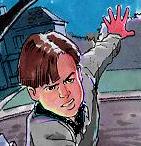The First Doctor WhoStory Ever Told |  |
Episode Four |
 |
The First Doctor WhoStory Ever Told |  |
Episode Four |
 |
Click here to Sign My Guestbook
NOTE: If you sign the guest book, the guest book service provider will take you to their site. So be prepared to hit the Back button about four times to return here, or bookmark this page. I look forward to feedback and hope you will sign my book!
View My
Guestbook
![]()